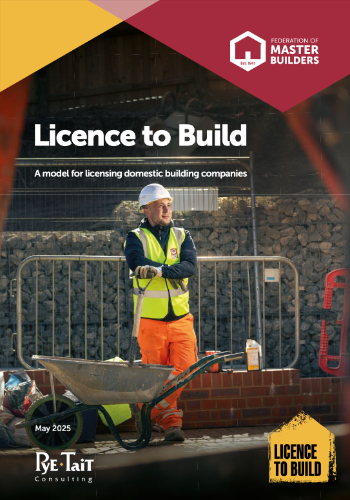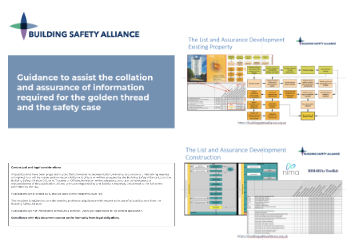Future homes hub
Contents |
[edit] Background
In 2019, as part of what it called the green housing revolution, the Government published a green standard to cut carbon emissions by up to 80% for all new homes from 2025. Unveiled by the Housing Secretary the Rt Hon Robert Jenrick MP, the Future Homes Standard aimed to promote and support the net zero target.
As part of this endeavour the Future Homes Task Force was set up in 2020. The brief for the Task force was to direct the construction and fabric efficiency of tomorrow’s new homes, how they are powered and how they take account of and impact on the environment within which they sit. The brief included the development of a master-plan, to sequence and prioritise work streams across the sector, including its supply chains, founded on the main environmental targets articulated by the government – the natural environment, resources, water, and air quality.
One of the first objectives of the Task Force was to establish a fully funded Delivery Hub to implement the master plan and drive forward work on a day-to-day basis.
[edit] Role
The Hubs website states:
In September 2020, the Future Homes Task Force was set up to develop a long-term delivery plan for the sector in line with the Government’s legally binding net zero and wider environmental targets. The Delivery Plan is divided into four areas with a goal and roadmap for each area.
The Future Homes Hub has been established to facilitate the collaboration needed within and beyond the new homes sector to help meet the climate and environmental challenges ahead.
[edit] Goals
The goals are:
- High-quality homes that are zero carbon ready and sustainable.
- Places and developments that are consistently low carbon, nature-rich, resilient, healthy, well designed and beautiful by 2025
- Production and construction methods that are net zero and sustainable by 2050 with substantial progress by 2025 and 2030.
- Businesses that are recognised and rewarded for net zero and sustainability performance
[edit] Activity
In practice this means several types of activity:
- Developing technical solutions for regulatory changes.
- Collaborating sector-wide to overcome barriers to successful implementation, for example on skills and supply chain.
- Developing industry-led proposals for current and future policy challenges.
- Creating the basis for measuring sustainability performance and capturing the value of improving performance.
- Communicating with all parts of the homebuilding sector, especially SME's.
- Facilitating sharing and learning across the sector.
[edit] Guidance
The Hub offers a variety of free guidance documents to the industry, including guidance on the 2022 revisions to Part L and the new Part O as well as renewable systems, car charging and much more.
For more information visit the hub website at https://www.futurehomes.org.uk/
[edit] Related articles on Designing Buildings
- BRE Group response to the Future Homes Standard consultation.
- BRE response to the green housing revolution.
- Climate change Act.
- Energy Act.
- Energy Performance Certificates.
- Energy Related Products Regulations.
- Energy targets.
- Future Homes Standard.
- Government Construction Strategy.
- Home design prospects under the Future Homes Standard.
- Sustainability.
- Sustainable materials.
- UK Green Building Council.
- Zero carbon homes.
- Zero carbon non-domestic buildings.
Featured articles and news
EPC changes for existing buildings
Changes and their context as the new RdSAP methodology comes into use from 15 June.
Skills England publishes Sector skills needs assessments
Priority areas relating to the built environment highlighted and described in brief.
BSRIA HVAC Market Watch - May 2025 Edition
Heat Pump Market Outlook: Policy, Performance & Refrigerant Trends for 2025–2028.
Committing to EDI in construction with CIOB
Built Environment professional bodies deepen commitment to EDI with two new signatories: CIAT and CICES.
Government Grenfell progress report at a glance
Line by line recomendation overview, with links to more details.
An engaging and lively review of his professional life.
Sustainable heating for listed buildings
A problem that needs to be approached intelligently.
50th Golden anniversary ECA Edmundson apprentice award
Deadline for entries has been extended to Friday 27 June, so don't miss out!
CIAT at the London Festival of Architecture
Designing for Everyone: Breaking Barriers in Inclusive Architecture.
Mixed reactions to apprenticeship and skills reform 2025
A 'welcome shift' for some and a 'backwards step' for others.
Licensing construction in the UK
As the latest report and proposal to licence builders reaches Parliament.
Building Safety Alliance golden thread guidance
Extensive excel checklist of information with guidance document freely accessible.
Fair Payment Code and other payment initiatives
For fair and late payments, need to work together to add value.
Pre-planning delivery programmes and delay penalties
Proposed for housebuilders in government reform: Speeding Up Build Out.
High street health: converting a building for healthcare uses
The benefits of health centres acting as new anchor sites in the high street.
The Remarkable Pinwill Sisters: from ‘lady woodcarvers’ to professionals. Book review.
Skills gap and investment returns on apprenticeships
ECA welcomes new reports from JTL Training and The Electrotechnical Skills Partnership.

























